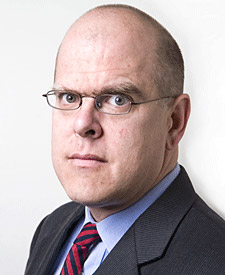


Senior Editor, The Weekly Standard
Listen as Christopher Caldwell explains that the recent wave of Muslim immigration has brought a new strain of antisemitism to Europe.
CHRISTOPHER CALDWELL:
There's something about the official status of Holocaust memory that has not worked the way one had hoped it would. You can see in the way that the term Holocaust gets manipulated in a lot of political discourse that a lot of the actors are treating the Holocaust as a Jewish thing. Whereas I think the proper way to treat it is as a human thing. The Holocaust has to be a lesson for humanity.
DANIEL GREENE:
Journalist Christopher Caldwell has written extensively on the recent wave of Muslim immigration to Europe. Immigration, Caldwell says, touches every corner of public life, from economics to politics to religion. Changing demographics have led to significant and sometimes violent cultural conflicts over free speech and religious expression. And, Caldwell says, a new strain of antisemitism is on the rise in Europe.
Welcome to Voices on Antisemitism, a free podcast series of the United States Holocaust Memorial Museum. I'm Daniel Greene. Every other week, we invite a guest to reflect about the many ways that antisemitism and hatred influence our world today. Here's journalist Christopher Caldwell.
CHRISTOPHER CALDWELL:
I tend to think that laws against Holocaust denial have done more harm than good. On a practical political level, I think that they give very intolerant mischief makers a cheap and easy way to pose as something more exalted than what they actually are, as sort of martyrs of free speech. But on a more theoretical level, I also think that they freeze the ability to talk about it. So I think that in an indirect way, they may further the climate in which the Holocaust is considered a Jewish affair. These laws I think can diminish the sense that this is an issue that engages all of society, and that a proper understanding of something like this is something that all of society has an interest in getting.
Four years ago, in 2002, I would have said that the old-style antisemitism—the kind that had its roots in right-wing organizations, in certain corners of the Catholic church, in certain survivals of World War II—I would have said that that kind of antisemitism—while not eliminated—had become so discredited and so un-chic, that it was really not something that any of the societies had to worry about. European kids have been taught a lot about this. I think they have a reflex against it.
But suddenly you have a France that has at least, you know, 5 million Muslims in it, recent immigrants. I'm not saying there's anything inherently antisemitic about their cultural background, but they have not been brought up in the same atmosphere of raised consciousness after the war. So you have that conflict kind of imported.
However, since then, you see evidence in the united Europe—in which there is free circulation of people and ideas—of a much more homegrown European-style antisemitism. You see a sort of waning of vigilance. You see a rise of the kind of clubby, dinner-party type antisemitism in England, where it is very strong. So I do think there is a new antisemitism, but I'm afraid it hasn't so much replaced the old antisemitism as exists alongside of it.
DANIEL GREENE:
Voices on Antisemitism is a free podcast series of the United States Holocaust Memorial Museum. Join us every other week to hear a new perspective on the continuing threat of antisemitism in our world today. To contribute your thoughts to our series, please call 888-70USHMM, or visit our Web site at www.ushmm.org. At that site, you can also listen to Voices on Genocide Prevention, a podcast series on contemporary genocide.